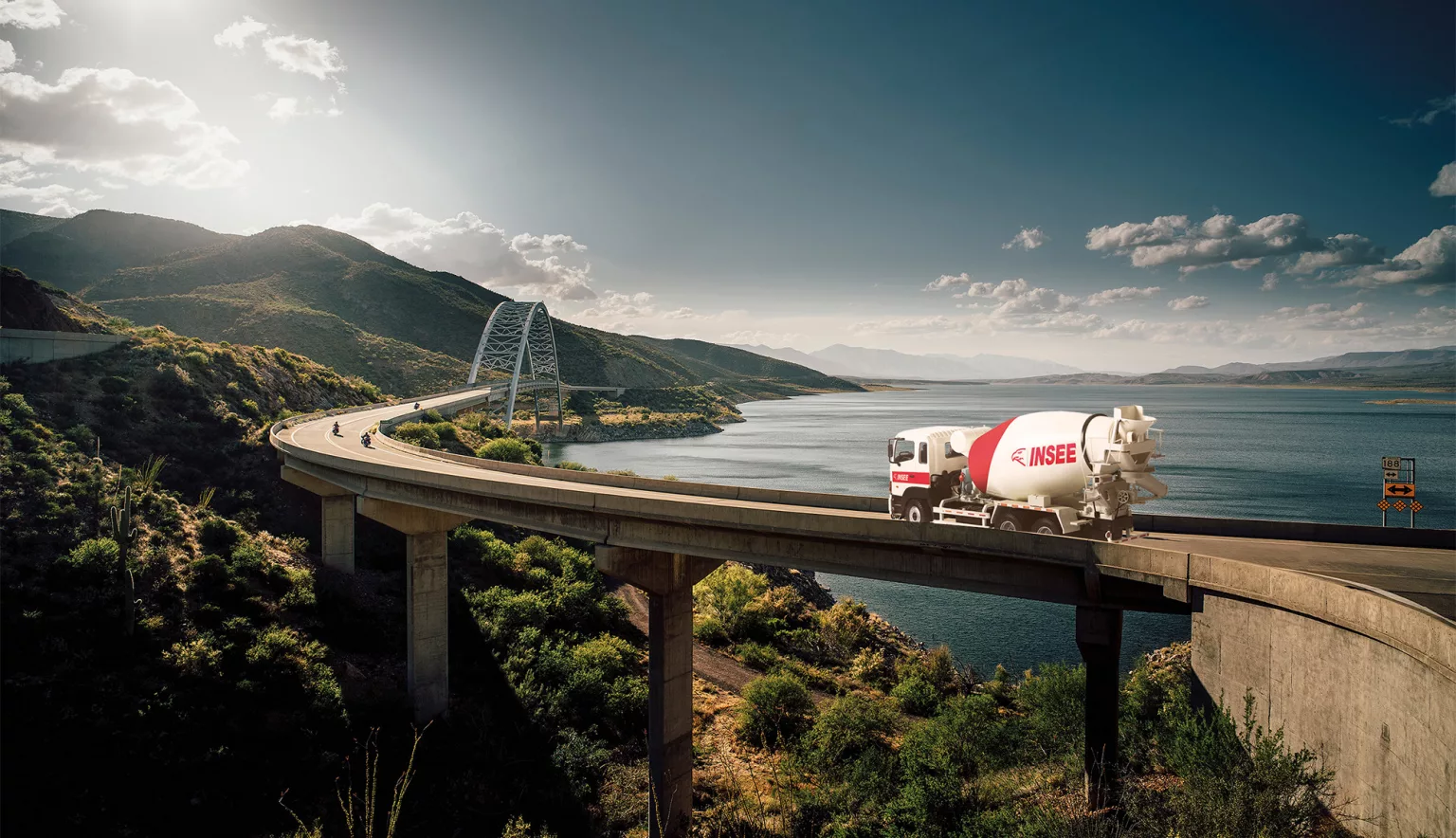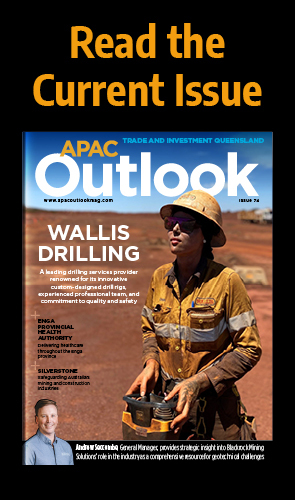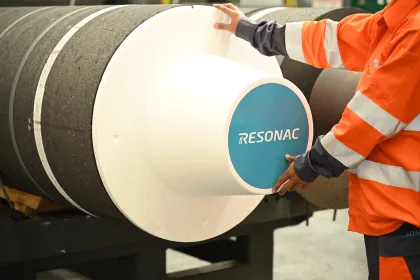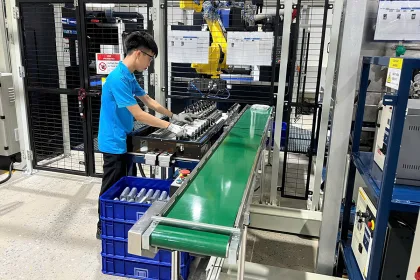A STEWARD OF THE COMMUNITY
“We are in the business for the long term and we offer long term services and product uptake in a spirit of mutual partnering and sharing of the co-created value”
Aiden Lynam, Group CEO
A FIRM GROUNDING
“The early pioneers of SCCC built a solid foundation over 50 years ago from its initial plant footprint at Saraburi, Thailand in 1969, and extended the operations to become one of the world’s largest single cement facilities,” Lynam says.
“All of our staff are proud to build on the work of our predecessors who have brought the company to where it is today over the course of five decades.
“It is half a century of dedication to excellence and to delivering quality products and services to our customers. All our employees are proud to be part of such a rich history, with its Thai heritage operating with international level competence and with a reputed corporate brand and firmly established asset footprint. We are very well positioned across the region we operate in, setting the Group up for strong growth and future success.”
Specifically, the Group CEO points to customer centricity and respect for all stakeholders, particularly in the communities around us, as truly distinguishing features of the organisation.
“These are fundamental hallmarks of why the Group has grown to become a reputed and well appreciated partner around the region in all the markets we are present in,” Lynam continues.
“We develop our people with a career-long perspective and stay well abreast of latest technologies and practices. We believe we differentiate through providing value-adding products and services which are tailored to customers’ needs, and by delivering peace of mind via well appreciated product brands.”
GREEN AT HEART
Another critical element of SCCC’s identity is its standing as a pioneer of sustainable operations and responsible practices, both internally and within the wider community.
The cement industry itself is not actually a carbon-dense contributor in comparison to other commonly used building materials, but this is not to say that the imperative to become leaner and greener is not there – in fact, for Siam City Cement Public Company Limited the opposite is very much the truth.
“Most of us are aware of climate change, and of the fact that humankind is currently consuming resources at a rate beyond which our plant can sustain long term,” Lynam says.
“Cement and concrete are, to date, some of the lowest carbon intensive building materials per unit of strength and per unit of cost. That said, it is incumbent on the industry worldwide to play its part, alongside others in the construction value-chain, in continuously reducing the carbon intensity of the built environment.
“SCCC understands that we have a responsibility to work with architects to design full-life-cycle living and work spaces, and to work with civil designers to use the most effective sustainable designs with maximised usage of lower carbon materials.
“We further acknowledge that, within the need for low carbon approaches from architects, urban planners and civil design engineers, the overall cement and clinker intensity in concrete should be minimised for any given strength class or application of concrete and that, in turn, the carbon intensity of cement, and its associated semi-finished product, clinker, must be reduced continuously over time.”
Importantly, SCCC converts its concern for the welfare of people and planet into tangible action across an enormous range of activities, not only because of the aforementioned reasons, but because it also makes good business sense.
Indeed, its sustainable development roadmap consists of five major axes which the company is currently in the process of realigning.
The first revolves around occupational health and safety. Here, the company is determined to assure the wellbeing of all staff and visitors at every facility across the network, the goal of zero harm very much sitting at the top of the SCCC agenda.
Second is reducing carbon footprint. This includes steering the product portfolio towards less carbon intensive products such as composite cements, high strength concrete and aggregates, using lowest energy intensive clinkers with a maximised amount of waste derived fuels, and using lowest thermal and electrical energy-based processes.
The third axis involves the company lowering its water footprint, not only in terms of consumption at its plants and facilities, but also utilising as much surface water as possible with minimised offtake of ground water.
Assuring best biodiversity practices at all quarries and facilities represents the fourth axis. SCCC has a memorandum of understanding with the International Union for Conservation of Nature (IUCN), a mechanism whereby IUCN supports the company in the deployment of best initiatives which seek to avoid or mitigate biodiversity impacts.
The fifth and final axis is all about fostering positive social responsibility. This involves respecting neighbouring communities and deploying meaningful CSR engagements, all the while assuring gender equality and respect for diversity in the workplace. Developing skills among local communities is also vital, INSEE Vietnam and the JV in Cambodia running their own in-house Enterprise Based Vocational Education units to apprentice technicians in mechanical and electrical maintenance and the process of cement production, whilst using the entire factory installations as the platform for embedded practical training. Apprentices gain nationally accredited diplomas and are upskilled with a world class curriculum to be selected for employment in the Company, or to work elsewhere with life-long marketable skills which their communities vitally need.
All of this CSR and sustainable development activity is underpinned by a specific theme – Green Heart.
“We believe that the success factors for a sustainable development policy and objectives come from knowledge, mindset and cooperation from employees and stakeholders,” Lynam explains.
“It is not just a concept but a set of actions which employees commit to, with pride. The company’s Thailand units have set Green Heart as the main theme for sustainability and CSR initiatives by focusing on activities which create awareness for environment, community and society by welcoming voluntary employees and stakeholders to participate in those activities.”
The Group CEO goes on to cite numerous examples of specific projects being carried out under the Green Heart umbrella.
These include the Green Heart Bank scheme, deployed at its facility in Saraburi, northeast of Bangkok, where it encourages employees to separate waste and deposit at the site each month. The idea is to engage staff on sustainable development and change behaviour patterns so that recycling is the norm – items such as office paper, plastic containers, glass bottles and aluminium cans are collected by the Green Heart Bank.
Meanwhile, a similar Green Village scheme supports communities nearby to separate waste and also engages in the planting of trees. Related to this is the One Child – One Tree programme, an initiative of INSEE Lanka which celebrates the birth of every child by gifting a fruit plant, the idea being to inspire and ignite youngsters to mind about the environment in the future.
ONE INSEE, ONE TEAM
The continuation of such sustainable and responsible endeavours both within Siam City Cement Public Company Limited and its wider communities is, of course, a major priority for the firm as the conversation turns towards the road ahead. This will require a continuing strong performance commercially, and the company is ambitious when it comes to expanding further into the company’s newer and more emerging markets.
“The fundamentals of demand for building products are driven mostly through rising populations in economies which are exhibiting strong GDP per capita growth,” Lynam explains.
“SCCC is positioned in some of Asia’s most robust growth markets, from Cambodia and Sri Lanka to Vietnam and Bangladesh. As capacity approaches high utilisation rates, we have our eyes on expansion in all of these markets.
“In Thailand we are growing profitability off the existing well positioned cement manufacturing asset base whilst also growing the lighter asset classes of light building materials, trading activities, and waste management and industrial services.”
And although SCCC is busy in several different countries, the group very much operates along the mantra of One INSEE, One Team, with harmonized systems and processes across the single Group and well-coordinated operations and growth initiatives in the empowered hands of a unified team.
“We believe in recognising employee success and achievements and in celebrating ‘along the way’, be it in regular staff gatherings and townhalls or awards events annually or throughout the year,” Lynam continues.
“Recognition can be very simple and ‘on the spot’ in appreciating good efforts – daily, simple interactions between management and staff are important to us. At SCCC we believe in developing and empowering our staff to continuously improve and to grow, to self-develop and to prosper with the company.”
He also reinforces the message about health and safety being the number one priority moving forward, with SCCC’s leadership made accountable to assure the wellbeing of all its employees and visitors to its facilities. From regular formal internal communications using digital tools to face to face interactions via monthly town halls and check-ins, regular feedback is taken and acted upon.
The communication stream is very much a two-way dialogue, the company striving to realise the importance of assuring that directional and functional objectives are understood well by all staff, and then assuring unambiguous clarity on what any leader or employee is accountable for.
“We have, together, come through a very traumatic and anxiety-laden period with the COVID-19 pandemic,” Lynam adds. “And our staff in all corners of the organisation have proudly risen to the occasion, demonstrating a strong and combined corps d’esprit, showing the indomitable pulse of the INSEE heart.”
Every day the firm relies on numerous partnerships with stakeholders up and down the supply chain, a fact which is not lost on Lynam, who explains how such relationships will become even more critical as further expansion at Siam City Cement Public Company Limited arrives in the months and years ahead.
Indeed where suppliers are concerned, he says that the very nature of manufacturing and delivering building materials requires best practices in supply chain and logistics excellence over the long term, not least during times when disruption levels are high.
“Siam City Cement Public Company Limited supports the philosophy of building long lasting partnerships and relationships with suppliers and logistics providers,” he adds. “We are in the business for the long term and we offer long term services and product uptake in a spirit of mutual partnering and sharing of the co-created value.
“We prefer to work on a total cost of ownership basis over full product and service lifecycles. We believe in the notion of a ‘fair deal’ and offer transparency and equitable relationships.
“We want to work with suppliers who have similar mindsets and who place value on governance, sustainability and the longer term. Suppliers who value safety and the health and wellbeing of their own employees and their sub-suppliers in turn normally tend to share our mindsets – this supports mutual brand and reputation building.”
Indeed, delivering long-term objectives to customers, employees and other stakeholders forms the crux of SCCC’s strategy for the future.
In the more immediate term, the priority remains to emerge as strongly as possible from the current economic shock caused by the COVID-19 pandemic.
Uncertainty still remains as to the extent of disruption and economic fallout that will follow over the next couple of years, meaning that the SCCC leadership is focusing staff on what they can control – from internal procedures and processes to innovation and enhanced offerings and service to its customers.
The Group CEO concludes: “Having well managed the immediate and initial crisis, we have our targets set on emerging fitter, more agile and more competitive.
“We are focusing on competitive go-to-market approaches which place the customer firmly at the centre, welded to the never-ending quest for improved internal efficiencies. Currently, with visibility low for the coming period through 2021 and 2022, Siam City Cement Public Company Limited is taking a prudent and yet ambitious approach, assuring a strong balance sheet which renders us, along with a productive leadership and workforce, extremely well positioned for future growth in the Asian markets, both organic and otherwise.”
“We continue to prioritise being a respected and highly valued participant in the Asian growth story, and in delivering superior customer service and product quality”.






















